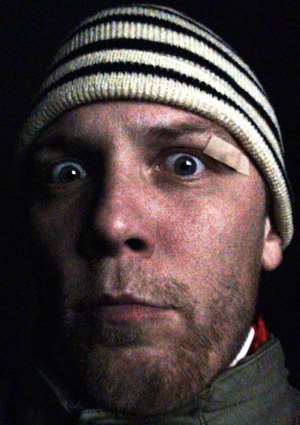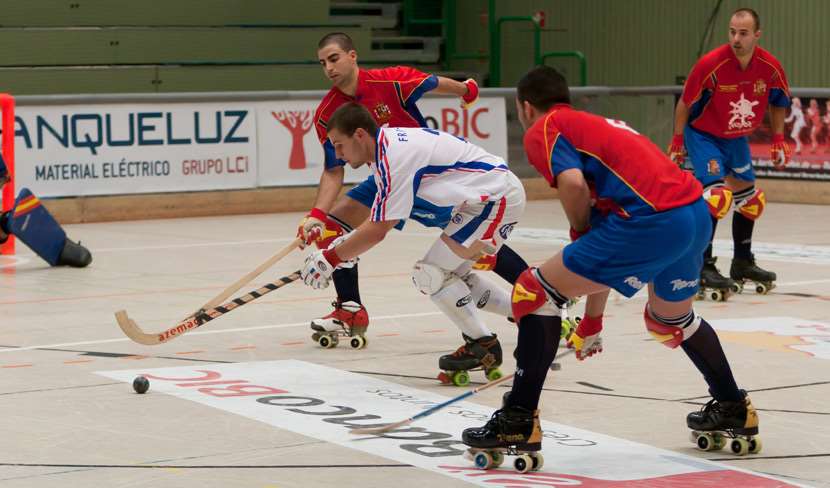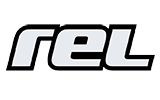Interview with the international referee Boris Tarassioux
Par alfathor |
Publié le 7 December 2011 |
Mis à jour le 3 November 2020 |
Catégories :
rink-hockey and hardball hockey
All
All
rink-hockey and hardball hockey
| Sous-catégories :
Roller-skaters interviews and portraits
Roller-skaters interviews and portraits
| 8663
| Tags :
interview Boris Tarassioux
Interview rink hockey referee
rink hockey referee
boris tarassioux international referee
They are often the pet hates of the spectators and of the (bad) players, they are booed and play a role as ungrateful as essential: the men in black and white! Let’s meet Boris Tarassioux, an international referee of Rink Hockey…
National and international referee
 Surname: Tarassioux
Surname: Tarassioux
Name: Boris
Nickname: Bobo / Psycho
Birthdate: Apr. 2nd, 1974
Size: 172 cm
Weight: 68 kg
Born in: Lyon (Fra, 69)
Lives in: Tours (Fra, 37)
Practicing since: 1982
Category: Veteran
Occupation: Computer specialist
Studies: STAPS (sports)
Strong points: Former player
Points to improve: Keeping cool under any circumstances
Other sports: Marathon
Best sportsperson: Alain O’Kacha Mimoun
Last movie seen: Melancholia
Best music: Angus & Julia Stone
Video games: The Raving Rabbids
Books: The Shock Doctrine by Naomi Klein
Best accessory: Hat
Loves: food
Hates: Ties
Qualities: Tough
Drawbacks: None!
Club: Roc Vaulx-en-Velin
Team: Not anymore
Best memory: Silver medal at the 1989 European Championships in the -17 category in Anadia (Portugal).
Worst memory: Match against Quévert in Noisy-le-Grand in 1997
Spoken languages: French, English, Spanish
Alcohol or fruit juice? More fruit juice, but alcohol too
Hard or soft wheels? Soft
Sea or mountain? Mountain
Morning or evening? Morning
Cheese or desert? Cheese
Rap or techno? Rap
Football or rugby? Rugby
Record of achievements: 10 titles of French champion in the junior category, 2 times French vice-champion in Senior National 1
The interview…
Hi Boris, could you present yourself?
My name is Boris and I work in a computer company, I do data migration for pension funds, banks, insurance companies…
What is your skating history?
I started skating in 1981-1982 after a local club had made an organized activity in my town, Vaulx-en-Velin, where there was a demo. At first, I liked the feeling of speed you had on skates, and its exhilarating effect. I was more into skating than into pure hockey then. Rink hockey was the discipline proposed in my club, and I had a go… but still I like Rink Hockey and collective sports!
Have you always practiced Rink Hockey? Are you attracted by other disciplines?
Before, I did swimming, football, gymnastics. Then I totally devoted myself to Rink Hockey. I always restricted myself to Rink Hockey. I tried inline skating 15 years ago.
For the record, we mainly tried inline skates because we thought that we would be more efficient on the rink. Then we realized that, on small areas, quad skates are more reactive, especially because of the toe stops. On 40 m x 20 m rinks for example, quads will be preferred. On the other hand, on 30 m x 60 m rinks, inline skates are more suitable. Until only two years ago, in Rink Hockey, we could choose between the two. Now, you can only wear quad skates. We did standing start tests on 300 m opposing quads and inlines, and we realized that inlines needed 40 m to catch up with quads…
I’m quite interested in Roller Derby today. I’ve just moved in Tours. And I think I’ll start reffing derby… I like the ‘revival’ side of Derby. When I was young it looked like catch and I liked it. And now I like the fact that the practice is developing in France and at the international scale. And the girls are a bit riotous too…
How do you choose to become a referee? is it a vocation?
For my case, it’s a bit special, I had to take my national referee test because of a discipline problem with… a referee!
I couldn’t bare that referees made mistakes. I had the feeling to witness and live unfairnesses. In the facts and with the experience I have acquired, I realized that referees don’t make mistakes on purpose. Lots of decisions depend on the game circumstances and sometimes you make the wrong choice. In reffing, I became more tolerant. But I was already reffing for the juniors at around 16 or 17 to give a hand and I liked it.
What do you like in the fact of being a referee?
I’ve been reffing for 21 years, I like the adrenalin of it, being in contact with the best players in the world. I like traveling too. I like reffing kid games. I like what I do. With kids it’s the opportunity to learn the rules, and with the seniors you live great moments.
Our aim is to be transparent so that people forget about the reffing and enjoy playing. No congratulations needed, as long as there is nothing to disagree with the reffing.
What is the role of the referee?
Enforcing the rules in order that the game takes place in the best conditions as possible. The aim is to enable the players to devote themselves to the game in terms of intensity of play. It is our job to handle the intensity and temper the situation if needed. When you reach a too high level of intensity and the players exceed the limits or rules, it can be dangerous. Players shouldn’t feel that they are attacked by their opponents. The rules are made to manage the commitments of both teams. The referee does his best to loosen the game as much as possible.
Whipping boys?
When I was young, I suffered from that. I don’t want to ref with prejudices. You know that in some game situations some things are likely to happen, but I try not to prejudge the action of a player because I suffered too much from that. That’s not easy because when you know the character of a player, you tend to have a closer eye on him than on the others.
What is the training to become a referee?
You just have to follow the regional trainings. Generally, there is at least one training per year to become a regional referee with a practical and theoretical test. then after a few years, you can take another test to become a national referee.

How do you cope with conflicts on the rink?
It’s not always easy. The best thing is to make each player recognize their faults in order to calm down the situation in a pedagogical way. But everybody is not receptive to dialogue. Again, according to the intensity, it’s better to play the card of pedagogy than to punish. Giving cards doesn’t always settle the situation. Talking is better to evacuate the pressure.
Is a good player a good referee?
It can help to know the game, the mistakes made ;) or taken, but it’s not enough.
All the players don’t necessarily know the rules and judging a situation is not always easy given the game speed.
In fact no, it’s the same as for coaching, a good player won’t necessarily be a good referee. Sometimes it helps, but I know excellent referees who never played. There is no generality.
What are the essential qualities to be a referee?
Concentration, endurance, calm. When I was a player, I was the opposite! As a referee, you have to ooze calm and serenity in order to avoid brushes with the players. Even if you seethe to yourself, you mustn’t show it so that the players don’t have any harshness to cling to.
How is reffing with foreign colleagues?
Generally in the European Cup, you are with referees of your country, but in the other international competitions, you ref with other nationalities…
I like speaking in every language even badly and I like forcing myself to say a few words in their languages: Italian, German, Spanish and even Indian! Everything usually goes well. Sometimes there are a few tensions with referees of some Iberian nations. Some of them are not really humble… You have to recognize your faults in order to correct them and improve. Everything goes well at 99%!
What are the easiest and the most difficult nations to ref?
Spain is the easiest nation to ref because their play is very clean. The Portuguese and the Argentineans have a very impulsive play and are on the verge of the rules, which potentially leads to conflicts.
Being an international referee must require a good bunch of sacrifices…
In terms of time yes, as it encroaches upon your weekends, even your holidays for the big competitions lasting one week. As for the rest, it’s the continuity of the reffing of the first division.
Do you do lots of international trips?
For the moment in Europe only: Portugal, Spain, Italy, Germany, Switzeland, England, I can handle it.
To make it simple, it takes 6-7 weekends per year and 1 to 2 weeks for the big competitions (European and World championships).
What would you say to a young person who hesitates to become a referee?
You cannot learn everything at once and be infallible.
You shouldn’t be afraid to take it up, practicing reffing enables to gain in self-confidence and improve all the time.
A few words to conclude?
Way of Life: Flight of the Conchords “Ladies of the World” >>
Useful Links
The Rink Hockey section on OnlineSkating.com
Translated by Close Yr E’s
